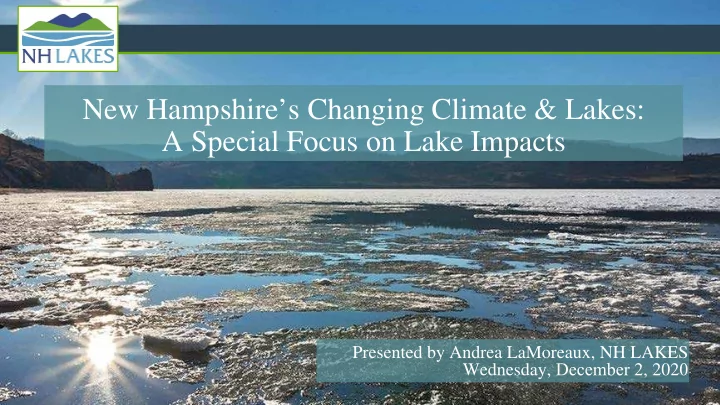

New Hampshire’s Changing Climate & Lakes: A Special Focus on Lake Impacts Presented by Andrea LaMoreaux, NH LAKES Wednesday, December 2 , 202 0
New Hampshire is home to some of the cleanest and healthiest lakes in the country.
But, our lakes in New Hampshire are showing more and more signs of being stressed. Climate change is making it worse.
Weather extremes are having extreme impacts on the health of our lakes… and extreme impacts on our enjoyment of our lakes, and on our economy.
We are experiencing slightly more rain, but in fewer, more intense storms. This is causing increased periods of flooding and drought.
Flooding causes large volumes of runoff water to flow into lakes. Runoff washes in pollutants that fuel the growth of plants, algae, and blooms of dangerous bacteria and toxic cyanobacteria.
Periods of drought result in low lake water levels. Low water levels cause access issues & navigation hazards, reduced in-lake wildlife habitat areas, & stress drinking water sources.
On average, “ice-in” is occurring later & “ice-out” is occurring earlier. A shorter period of ice cover means a longer growing season for plants (invasive plants, too!), algae, and toxic cyanobacteria.
A shorter period of ice cover and less solid ice reduces opportunities for on-ice activities. Less ice on our lakes means less tourism, and less tourism revenue for local economies and the state economy.
In general, warmer summer lake water temperatures fuel more plant, algae, bacteria, and cyanobacteria growth.
As summer goes on… With warmer air temperatures, our deeper lakes may stratify earlier and for longer periods. nutrients oxygen nutrients Fall Summer the middle layer of temperature moves down, and the bottom This could increase oxygen depletion in the bottom layer, layer is ‘sealed off’ from the atmosphere. Oxygen gets and may cause nutrients to be release from the sediment. used up in bottom layer and nutrients build up. Nutrients would be mixed throughout the lake during fall “turnover”…
As summer goes on… ….causing algae and cyanobacteria blooms.
In general, as our lakes warm new invasive species may be able to survive and thrive in our lakes.
New Hampshire’s changing climate is making our work for clean and healthy lakes more challenging, but more important than ever.
Recommend
More recommend